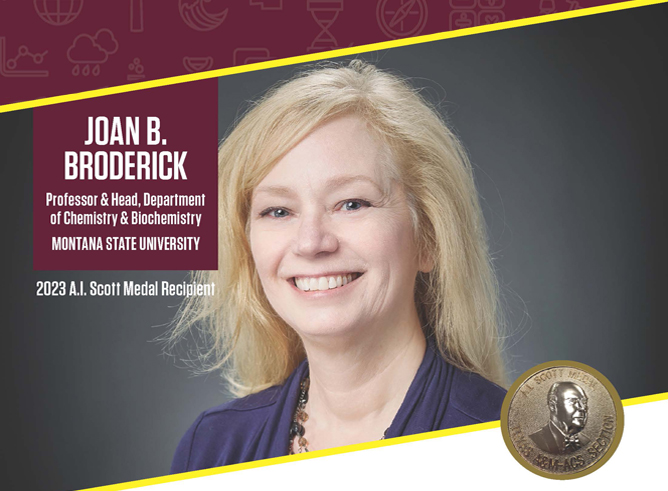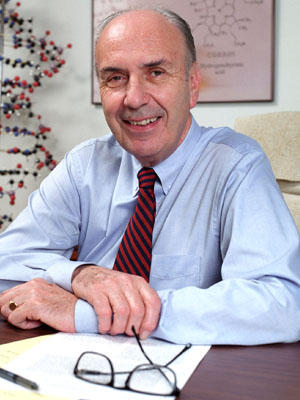
Dr. Joan B. Broderick, professor and head of the Department of Chemistry and Biochemistry at Montana State University, has been selected as the 2023 recipient of the A.I. Scott Medal for Excellence in Biological Chemistry Research, named for one of the leading faculty members in Texas A&M University's rich chemistry-related history.
The medal is jointly awarded each year by the Texas A&M Department of Chemistry and the Texas A&M Section of the American Chemical Society (ACS) in tribute to Dr. A. Ian Scott, a Texas A&M distinguished professor of chemistry who made tremendous scientific contributions, both to the university and to the international chemistry community, during his 30-year career.
Broderick will be honored during an afternoon symposium set for Friday, Oct. 13, within Texas A&M's Interdisciplinary Life Sciences Building. In addition to Broderick's 4:30 p.m. keynote presentation, "Radical SAM: How Nature Generates and Controls Reactive Radical Intermediates," the event will feature preceding talks by University of South Carolina chemist Dr. Caryn E. Outten and Boston University chemist Sean J. Elliott. The symposium will be followed by an invitation-only dinner, at which Broderick will be presented with the Scott Medal.
 Scott was a pioneering chemist who came to Texas A&M in 1977 and achieved worldwide recognition for his discovery of how bacteria produce vitamin B12 as well as his study of the cancer drug taxol. Named a distinguished professor of chemistry and biochemistry at Texas A&M in 1981, Scott held the Robert A. Welch Chair in Chemistry and also was the D.H.R. Barton Professor of Chemistry. He contributed to numerous other works, including breakthroughs related to the essential life pigments chlorophyll and heme along with antibiotics that fundamentally impacted the field of biosynthetic investigation and helped revolutionize both organic and natural product chemistry, before his untimely death in 2007 at age 79.
Scott was a pioneering chemist who came to Texas A&M in 1977 and achieved worldwide recognition for his discovery of how bacteria produce vitamin B12 as well as his study of the cancer drug taxol. Named a distinguished professor of chemistry and biochemistry at Texas A&M in 1981, Scott held the Robert A. Welch Chair in Chemistry and also was the D.H.R. Barton Professor of Chemistry. He contributed to numerous other works, including breakthroughs related to the essential life pigments chlorophyll and heme along with antibiotics that fundamentally impacted the field of biosynthetic investigation and helped revolutionize both organic and natural product chemistry, before his untimely death in 2007 at age 79.
A pioneering bioorganic chemist in her own right, Broderick's research focuses on iron-sulfur clusters and S-adenosylmethionine (SAM) and how they are used by enzymes to initiate radical reactions essential to life. Her other research interests include the biological assembly of complex metal clusters and the trafficking, storage and utilization of iron and sulfur in biology. She is a member of the National Academy of Sciences and the American Academy of Arts and Sciences as well as a fellow of the American Association for the Advancement of Science.
Broderick initially became intrigued by the interface of chemistry and biology as a high school student at an all-girls school in Bellevue, Washington. En route to earning her undergraduate degree at Washington State University in 1987, she worked in both biochemistry and inorganic chemistry laboratories, served as the chemistry department’s X-ray crystallography assistant and published three research papers, including one as first author. Broderick earned both a master’s of science degree and a Ph.D. in 1992 at Northwestern University working with Tom O’Halloran as a National Science Foundation Graduate Fellow studying mechanistic aspects of the non-heme iron enzyme chlorocatechol dioxygenase. She subsequently completed an American Cancer Society Postdoctoral Fellowship with 2015 Scott Medal recipient JoAnne Stubbe at the Massachusetts Institute of Technology that focused on mechanism of the coenzyme B12-dependent ribonucleotide reductase. In 1993, Broderick began her independent academic career as an assistant professor at Amherst College working on radical SAM enzymes with undergraduate research students. She moved to Michigan State University in 1998, where she was an assistant, associate and full professor prior to moving to Montana State University, where she has been since 2005.
Broderick's many career awards to date include the American Chemical Society Bader Award in Bioinorganic or Bioorganic Chemistry, the Saltman Award of the Metals in Biology Gordon Conference, the MSU Women in Science Distinguished Professorship, the MSU Presidential Medallion, the Illinois Distinguished Lecturer in Inorganic Chemistry and the Calvin Lecturer at the University of California, Berkeley. In addition to serving on both the Department of Energy Basic Energy Sciences Advisory Committee and the American Society for Biochemistry and Molecular Biology Council, she is an associate editor for the Journal of Biological Chemistry.
For more information on the Scott Medal Symposium, contact Texas A&M Chemistry at (979) 845-9829 or via email at chemhead@chem.tamu.edu.

